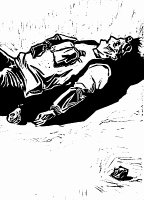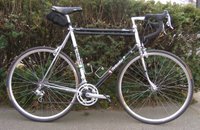 Note: This was originally posted on the Velo Orange blog.
Note: This was originally posted on the Velo Orange blog. Ottavio Bottecchia was the first rider to lead the Tour de France from start to finish, winning in 1924 and 25. He was known as "Le Macon de Frioul" (the Mason from Frioul) and was a hero to all of Italy.
But this post is not about Bottecchia's racing career, but about his death. In 1927 Ottavio died under mysterious circumstances. He had gone on a training ride and was found bloody and beaten by the side of the road near a vineyard. He soon died of his injuries.
Some in the Italian press claimed, based on the official police report, that he had crashed. But Bottecchia's bike was propped up neatly at the side of the road undamaged.
Others said he had stopped at the vineyard to eat a few grapes and was beaten up by a furious farmer, but the grapes had not yet ripened. Though some say a farmer confessed to hitting him in the head with a stone.
It is far more likely that Bottecchia was murdered for political reasons. Italy was in the midst of a Fascist take-over. As so often happens in difficult times, some people were willing to trade freedom for a sense of
 security. And, predictably, the right wing had stepped in to take advantage. Benito Mussolini and the Fascist Party badly wanted the support of Italy's great sports hero. They had already been using him as a role model for their vision of a fascist Italy.
security. And, predictably, the right wing had stepped in to take advantage. Benito Mussolini and the Fascist Party badly wanted the support of Italy's great sports hero. They had already been using him as a role model for their vision of a fascist Italy.
But it seems that Ottavio Bottecchia was no facsist. Some said he was a socialist and was willing to speak out about his beliefs. And for this the fascist thugs had good reason to murder him. His injuries included a fracture at the base of the skull, a broken clavicle, and many bruises. Yet no one dared call his death a murder.
And so the Fascists came to power and launched a senseless war in Ethiopia; it is easier to consolidate power during a war. Soon Mussolini joined Hitler in an attempt to conquer all of Europe. And he eventually was excecuted and hung from a street lamp in Milan along with others of his ilk.
Some time later, in New York city, an Italian immigrant, on his death bed after being stabbed, confessed to being hired to murder Bottecchia. The priest who administered last rites to Bottechia confirmed this story from his own death bed in 1973.
Framemaker Teodoro Carnielli, a longtime friend of Ottavio's, created bicycle frames bearing Bottechia's name. These frames, later produced by Carnielli S.P.A., have been ridden by five Italian champions and four world champions. Greg Lemond rode a Bottecchia bike when he won the 1989 Tour de France.




